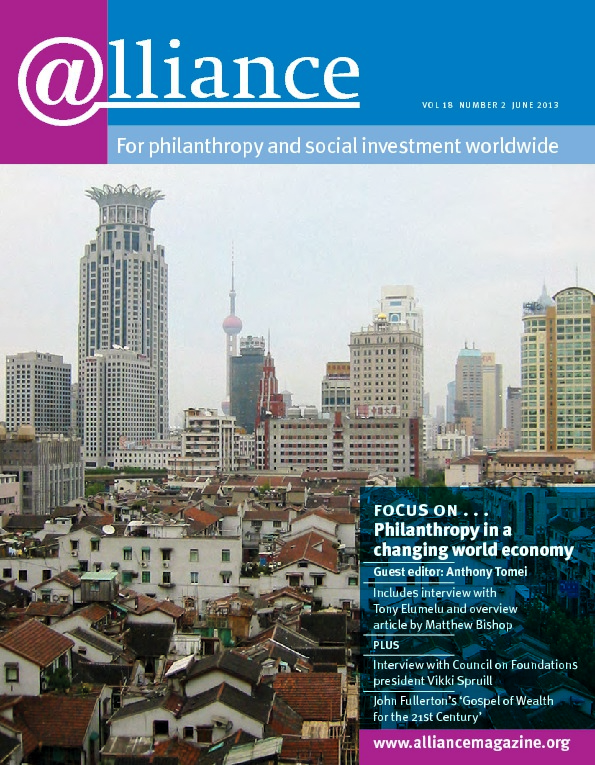The financial crisis in 2008, the sovereign debt crisis and the political crisis in the following years have proved wrong the idea that an economic system based on unbridled consumerism can make even the poorest populations wealthy. Indeed, the Gini Index shows inequality is rising almost everywhere. In such an environment, philanthropy as an expression of organized social generosity and inclusiveness has been marginalized.
It has also highlighted a paradox. Philanthropy takes the financial resources it needs to solve the social problems generated by markets from its investments in those markets and from the subsidies governments give to the third sector – that is, from those same markets and governments that are primarily responsible for the crisis.
What is more, the financial resources used to solve social problems are too small and come at a slower pace than the problems to be solved, so philanthropy runs the risk of being seen as the proverbial ‘sticking plaster’ rather than a real solution. There is only one way out: governments, markets and philanthropy must build a common strategic social agenda that helps them to take action before problems arise. In that team, philanthropic players must be a strategic partner, one that makes its crucial contribution to shaping a vision for our society so as to make it a place where we want our children to live. This is a ‘political’ role for philanthropy, ‘political’ in its noblest meaning: philanthropic players must be the partner that proposes a common vision for society and for civilization.
In the face of these challenges, foundations must also change their own strategy. What have we changed at Fondazione Cariplo?
The foundation has only two assets: people and money. As far as people are concerned, we have pushed hard to boost the professionalism of our human resources, listening to the needs of the third sector; opening up to meeting people and listening to their needs – and being ready for the shocking experience that can be; engaging policymakers; opening up to partnerships domestically and internationally; creating communities of practice and of learning with the third sector.
As an example, in 2010 Fondazione Cariplo launched two important programmes dedicated to the professional development of foundation practitioners: the European Learning Lab and the international exchange programme TIEPOLO, run in collaboration with the European Foundation Centre. In parallel, we have fostered an empowered organization, both at staff and management level: more than ever foundations need engaged and motivated professionals to cope with the growing number of grant requests, largely resulting from the shortage of public and private funds.
As to programmes, there is greater focus on those for young people, a greater emphasis on quality, a stronger demand for social impact. Though new funding lines have been established, for instance to help young people launch their own businesses, the foundation will continue to address long-standing community issues, like the needs of people with disabilities and the elderly.
We have also made changes in the way we fund. For over five years now, Fondazione Cariplo has been allocating a percentage of its assets to mission-connected investments. We believe, indeed, that well-conceived financial tools can respond more adequately to certain social needs. Furthermore, the revolving nature of MCIs provides for an ongoing funding source.
Following the experiences of the TT Venture fund (in the field of technology transfer), Microfinanza 1 and Fondo Federale di Lombardia (a real estate fund dedicated to social housing), we continue to explore new forms of venture philanthropy. In January 2013, we supported the launch of the OPES Impact Fund, an impact investing fund for seed and early-stage sustainable businesses that tackle the most critical problems affecting the very poor (water and sanitation, waste, health, education, energy and food). OPES’ mission is to fight global poverty through social enterprise, emerging entrepreneurs and cutting-edge ideas and solutions. OPES deploys capital provided by donors to make investments that yield both social and financial returns, and all funds returned to it are reinvested in new ventures.
Finally, let me add a general remark. European foundations are sensitive to social problems but notoriously insensitive about the ‘time’ variable. If you ask me if foundations are changing, my answer is yes. If you ask me if they are changing at a pace that is appropriate to the times, my answer is no.
Pier Mario Vello is secretary general of Fondazione Cariplo. Email PierMarioVello@fondazionecariplo.it






Comments (0)